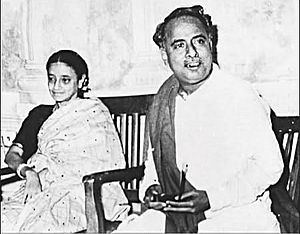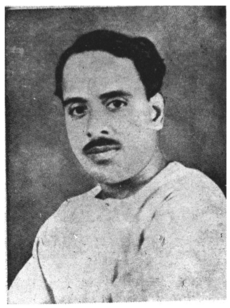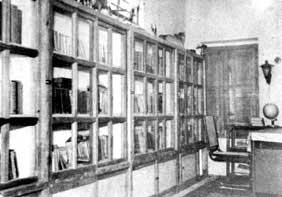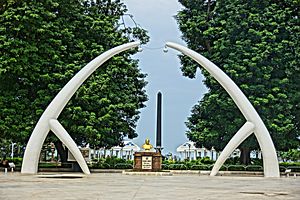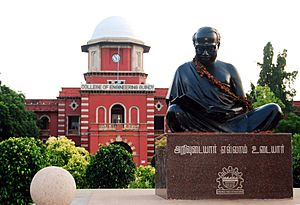C. N. Annadurai facts for kids
Quick facts for kids
C. N. Annadurai
|
|
|---|---|
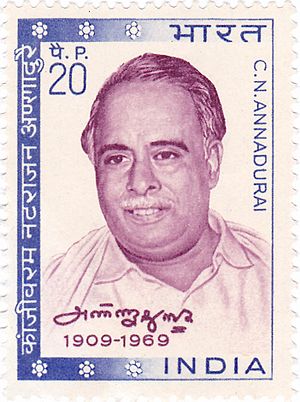 |
|
| 1st Chief Minister of Tamil Nadu | |
| In office 14 January 1969 – 3 February 1969 |
|
| Governor | Ujjal Singh |
| Preceded by | Position established |
| Succeeded by | V. R. Nedunchezhiyan (acting) |
| Constituency | Leader of the State Legislative Council |
| 5th Chief Minister of Madras State | |
| In office 6 March 1967 – 13 January 1969 |
|
| Governor | Ujjal Singh |
| Preceded by | M. Bhakthavatsalam |
| Succeeded by | Position abolished |
| Constituency | Leader of the State Legislative Council |
| Member of Parliament, Rajya Sabha | |
| In office 3 April 1962 – 25 February 1967 |
|
| Leader of House |
|
| Constituency | Madras State |
| Member of the Madras State Legislative Assembly | |
| In office 1 April 1957 – 18 March 1962 |
|
| Chief Minister | K. Kamaraj |
| Preceded by | Deivasigamani |
| Succeeded by | S. V. Natesa Mudaliar |
| Constituency | Kancheepuram |
| 1st General Secretary of the Dravida Munnetra Kazhagam | |
| In office 25 September 1960 – 3 February 1969 |
|
| Preceded by | V. R. Nedunchezhiyan |
| Succeeded by | V. R. Nedunchezhiyan |
| In office 17 September 1949 – 23 April 1955 |
|
| Preceded by | Position established |
| Succeeded by | V. R. Nedunchezhiyan |
| Member of the Madras Legislative Council | |
| In office 6 March 1967 – 14 January 1969 |
|
| Preceded by | Position established |
| Succeeded by | Rani Annadurai |
| Member of the Tamil Nadu Legislative Council | |
| In office 14 January 1969 – 3 February 1969 |
|
| Leader of House | Himself |
| Leader of the Tamil Nadu Legislative Council | |
| In office 16 January 1969 – 3 February 1969 |
|
| Preceded by | Position established |
| Succeeded by | M. Karunanidhi |
| Leader of the Madras Legislative Council | |
| In office 17 March 1967 – 14 January 1969 |
|
| Preceded by | R. Venkatraman |
| Succeeded by | Position abolished |
| Personal details | |
| Born |
Conjeevaram Natarajan Annadurai Mudaliar
15 September 1909 Conjeevaram, Madras Presidency, British India (now Kanchipuram, Tamil Nadu, India) |
| Died | 3 February 1969 (aged 59) Madras (now Chennai), Tamil Nadu, India |
| Resting place | Anna Memorial |
| Political party | DMK (from 1949) |
| Other political affiliations |
|
| Spouse |
Rani Annadurai
(m. 1930) |
| Profession |
|
| Awards | Chubb Fellowship (1968) |
| Nicknames |
|
Conjeevaram Natarajan Annadurai (15 September 1909 – 3 February 1969), known to many as Anna (meaning 'Elder Brother'), was an important Indian politician. He was the fourth and last Chief Minister of Madras State. Later, he became the first Chief Minister of Tamil Nadu after the state was renamed. He was the first leader from a Dravidian party to hold these top positions.
Anna was famous for his amazing speeches and was a talented writer in the Tamil language. He wrote and acted in many plays, some of which were even turned into movies. He was also the first politician from the Dravidian parties to use Tamil movies to share his political ideas.
Born into a regular family, he first worked as a school teacher. Then, he became a journalist and joined the Dravidar Kazhagam political party. He was a strong supporter of Periyar E. V. Ramasamy and became a key member of the party.
Later, Anna and Periyar had disagreements, especially about the idea of a separate state called Dravida Nadu. These differences grew, and Anna, along with his supporters, left the Dravidar Kazhagam. They started their own party, the Dravida Munnetra Kazhagam (DMK).
The DMK initially shared similar ideas with the Dravidar Kazhagam. However, after the Sino-Indian War in 1962, Anna decided to drop the demand for an independent Dravida Nadu. He was sent to prison many times for protesting against the ruling government. One major protest was the Madras anti-Hindi agitation of 1965, which helped his party gain a lot of support.
His party won a huge victory in the 1967 Madras Legislative Assembly election. His government was the youngest in India at that time. As Chief Minister, he made Self-Respect marriages legal. He also introduced a two-language policy and offered subsidies for rice. A big change was renaming Madras State to Tamil Nadu.
Sadly, he passed away from cancer just two years after becoming Chief Minister. His funeral was attended by a record number of people. Many places and organizations are named after him today.
| Top - 0-9 A B C D E F G H I J K L M N O P Q R S T U V W X Y Z |
Early Life and Education
Annadurai was born on 15 September 1909 in Conjeevaram, which was then part of the Madras Presidency. His family was not wealthy. His father, Natarajan Mudaliar, was a weaver, and his mother was Bangaru Ammal. His sister, Rajamani Ammal, helped raise him.
When he was 21 and still a student, he married Rani. They did not have their own children but adopted and raised Rajamani's grandchildren. Anna went to Pachaiyappa's High School. He left school for a short time to work as a clerk in the town's office to help his family financially.
In 1934, he earned a Bachelor of Arts degree from Pachaiyappa's College in Chennai. He then got a Master of Arts degree in economics and politics from the same college. He worked as an English teacher at Pachaiyappa High School. Later, he left teaching to become a journalist and entered politics. He edited several weekly magazines.
Views on Religion
Annadurai was a very open-minded person. Even though he didn't follow a specific religion himself, he believed in respecting everyone. When he became Chief Minister, he took his oath "in the name of conscience" instead of "in the name of god."
He famously said, "Only one race, Only one God" (Ondre Kulam Oruvanae Devan). This idea was meant to bring people together in Tamil Nadu. He also said he was like "a Hindu without the sacred ash, a Christian without the holy cross, and a Muslim without the prayer cap." This showed his respect for all faiths.
Anna would speak out against superstitions and unfair religious practices. But he never went against the good values that religions teach. He once explained his view on God: "I do not break coconuts for Pillaiyar (a form of worship), nor do I break his idols." This meant he didn't follow rituals he saw as superstitious, but he also didn't disrespect religious symbols.
Joining Politics
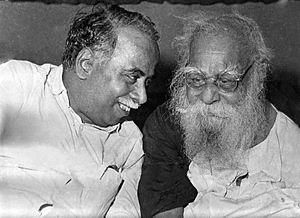
Anna's interest in politics led him to join the Justice Party in 1935. This party was started in 1917 by non-Brahmin leaders. It aimed to help people who were not Brahmins.
The Justice Party was in power in Madras Presidency from 1920 until 1937. By the time Anna joined, Periyar E. V. Ramasami was the party's president. Anna worked as a sub-editor for the Justice magazine. He later became the editor for Viduthalai (meaning Freedom) and also worked with the Tamil weekly paper, Kudi Arasu. He even started his own journal called Dravida Nadu. In 1944, Periyar changed the Justice Party's name to Dravidar Kazhagam and decided not to take part in elections.
Forming the DMK
The Indian National Congress was fighting for India's independence from British rule. Many leaders in the Congress party were Brahmins. Periyar believed that an independent India might lead to people from South India, especially Tamils, being controlled by Brahmins and North Indians. Because of this, Periyar wanted 15 August 1947, India's Independence Day, to be a day of sadness.
Anna disagreed with this idea. He felt that gaining independence was a great achievement for all of India. Also, Periyar's decision not to participate in elections was something Anna didn't agree with. Anna believed that social change could happen through politics.
Eventually, Periyar married Maniammai, who was much younger than him. This personal difference caused a big split between Anna and Periyar's supporters. Anna, along with his followers, left the Dravidar Kazhagam. They started a new party called the Dravida Munnetra Kazhagam (DMK).
The DMK first gained support in cities and nearby areas. Anna helped the party grow quickly by appealing to students, working-class people, and those from lower castes. He fought for social fairness for lower castes, which helped him gain a lot of public support.
Key Protests and Policies
In 1953, Anna led the DMK in three main protests:
- Against Jawaharlal Nehru, the Prime Minister, who called the tarring of Hindi letters on railway signs "childish nonsense."
- Against C. Rajagopalachari, the Chief Minister of Madras State, for a new education system that seemed to encourage old caste-based jobs.
- Against renaming Kallakkudi to Dalmiyapuram, as the new name seemed to represent North Indian control. He was jailed for three months during this protest.
The Idea of Dravida Nadu
When he was part of the Dravidar Kazhagam, Anna supported the idea of an independent state called Dravida Nadu. This idea continued in the early days of the DMK. However, after the Sino-Indian War in 1962, changes were made to the Indian constitution. The Sixteenth Amendment, also known as the Anti-Secessionist Amendment, stopped any party that wanted to break away from India from taking part in elections.
Anna strongly argued against this amendment in the Parliament of India, but it was passed. Because of these new rules, Anna and the DMK decided to put aside their demand for an independent Tamil homeland. From then on, Anna and the DMK focused on getting better cooperation between the southern states and more power for Tamil Nadu within India.
Anti-Hindi Protests
Hindi was suggested as an official language for India in 1928. People in Tamil Nadu opposed this, fearing it would make them second-class citizens compared to native Hindi speakers.
In 1938, the government in Madras Presidency tried to make Hindi a compulsory language in schools. Anna and other Tamil scholars protested. Two protesters died that year. Because of strong opposition, the order was removed in 1940. Anna once said, "You learn English for world communication and learn Hindi for communication in India. It seems like a big door for a big cat and a small door for a small cat. Why not let the small cat also enter the big door?"
When India became a republic in 1950, the constitution said Hindi would become an official language after 15 years, in 1965. Students in Tamil Nadu were worried. Anna famously said about making Hindi the official language: "It is claimed that Hindi should be the common language because it is spoken by the majority. Why should we then claim the tiger as our national animal instead of the rat which is so much more numerous? Or the peacock as our national bird when the crow is everywhere?"
In 1960, the DMK held a conference against Hindi being forced on them. Prime Minister Jawaharlal Nehru promised that English would remain an official language as long as non-Hindi speaking people wanted it. Anna asked for this promise to be made part of the constitution.
When no change was made to the constitution, Anna declared 26 January 1965, Republic Day, as a day of mourning. However, violence broke out, starting in Madurai and spreading across the state. Anna asked students to stop the protests, but some DMK leaders continued. Anna was arrested for encouraging the protests. Even though the DMK didn't directly cause the violence, the protests helped the DMK win the 1967 elections, and Anna became the Chief Minister.
Literary Contributions
Annadurai was known as one of the best Tamil speakers of his time. He had a unique style, using metaphors and pleasing sounds in his speeches and writings. He was also very good at speaking without preparation.
He wrote many novels, short stories, and plays that included political ideas. He even acted in some of his own plays. He was important in using movies to spread the ideas of Dravidian politics. Anna wrote the scripts for six movies.
His first movie, Nallathambi (Good Brother, 1948), promoted cooperative farming and ending the zamindari system (a land ownership system). His novels like Velaikaari (Servant Maid, 1949) and Or Iravu, which were made into movies, also spread Dravidian political messages. Velaikari spoke out against unfair landlords. His movies often included ideas against the Indian National Congress party and the anti-Brahminism movement.
Some of his books, like Arya Mayai (Aryan Illusion), discussed social issues and aimed for an equal society without caste differences. He was once fined and jailed for this book.
Some of his other famous works include Annavin Sattasabai Sorpolivukal (Anna's speeches at the state legislative, 1960) and Ilatchiya varalaru (History of Ideals, 1948). His work Kambarasam criticized the Ramayana written by Kamban. His fictional works also contained political messages.
When the DMK used movies for their ideas, censorship was a problem. To get around this, DMK movies used Anna's popular nickname, Anna, which also means elder brother in Tamil. When characters in movies praised "Anna," the audience would cheer, understanding it was a hidden message about him.
As Chief Minister
In May 1956, the DMK decided to take part in India's second general elections in 1957. Anna was elected from his home area, Kanchipuram, to the Madras Legislative Assembly. The DMK won 15 seats, and Anna became the leader of the opposition. In 1962, the DMK became the main political party in the state outside the Congress, winning 50 seats. Even though Anna lost his election, he was chosen as a member of parliament for the upper house (Rajya Sabha).
In 1967, the Congress party lost power in many states, but only in Madras state did a single non-Congress party win a clear majority. This victory was helped by an agreement among non-Congress parties to work together. C. Rajagopalachari, a former Congress leader, played a key role in bringing these parties together against the Congress. Anna's cabinet was the youngest in the country at that time.
Anna's government made Self-respect marriages legal for the first time in India. These marriages did not need priests, meaning a Brahmin was not required to perform the ceremony. Self-respect marriages were an idea of Periyar's, who believed traditional marriages often caused debt through dowry. Anna also promised to subsidize the price of rice, which he did for a while. This promise of cheaper rice is still used in elections in Tamil Nadu today.
It was Anna's government that officially changed the name of Madras State to Tamil Nadu. This name change had been suggested before but was not passed. With Anna as Chief Minister, the state assembly successfully passed the bill.
Anna also helped organize the World Tamil Conference with UNESCO in 1967. Another major achievement was introducing a two-language policy instead of the three-language formula used in neighboring states. The three-language formula required students to learn their regional language, English, and Hindi. Anna's policy focused on regional language and English.
During his time as Chief Minister, the Second World Tamil Conference was held in January 1968. When a stamp was released for the conference, Anna was unhappy that it included Hindi text, as it was for Tamil. Anna also ordered that pictures of gods and religious symbols be removed from public offices and buildings. He traveled the world, visiting Yale University and being the first non-American to receive the Chubb Fellowship. He also received an honorary doctorate from Annamalai University.
Death and Legacy
On 10 September 1968, Annadurai went to New York for medical treatment for cancer. He had surgery at the Memorial Sloan Kettering Cancer Center. He returned to Chennai in November but continued to attend official events against medical advice. His health got worse, and he passed away on 3 February 1969. His cancer was linked to his habit of chewing tobacco.
His funeral had the largest number of attendees ever recorded at that time, with an estimated 15 million people. His body was buried at the northern end of Marina Beach, which is now called Anna Memorial.
Since Anna's big election win in 1967, the Congress party has not returned to power in Tamil Nadu. His government was the first non-Congress party to win with a full majority in the country. When the DMK later split, M. G. Ramachandran formed his own party and named it after Annadurai: Anna DMK.
Many places are named after him, like Anna Nagar, a neighborhood in Chennai, and Anna University, a top science and technology institution. The DMK's main office is called Anna Arivalayam. A major road in Chennai, formerly Mount Road, is now called Anna Salai, and a statue of Anna stands there.
In 2009, the government released a special ₹ 5 coin to celebrate his 100th birthday. Jawaharlal Nehru praised him as one of the greatest parliamentarians for his speeches. India Today magazine listed Annadurai among the "Top 100 people who shaped India." In 2010, the Anna Centenary Library was built in Chennai in his memory.
On 1 October 2002, a life-size statue of Annadurai was unveiled in the Parliament House by the then President of India, A. P. J. Abdul Kalam. On 31 July 2020, the Alandur metro station in Chennai was renamed Arignar Anna Alandur metro station to honor him.
Filmography
| Year | Film | Credits |
|---|---|---|
| 1949 | Velaikaari | Story, Screenplay and Dialogues |
| 1949 | Nallathambi | Story, Screenplay and Dialogues |
| 1951 | Or Iravu | Story and Dialogues |
| 1954 | Sorgavasal | Story and Dialogues |
| 1956 | Rangoon Radha | Story |
| 1959 | Thaai Magalukku Kattiya Thaali | Story |
| 1961 | Nallavan Vazhvaan | Story |
| 1962 | Edhayum Thangum Idhayam | Story |
| 1970 | Kadhal Jothi | Story |
| 1978 | Vandikaaran magan | Story |
Anna's first movie script, for his play Velaikkari, earned him ₹ 12,000. This was a lot of money back then!
Also, the names of some of Anna's works were used as film titles for other movies, like Panathottam (1963) and Kumarikottam (1971).
Images for kids
See also
 In Spanish: C. N. Annadurai para niños
In Spanish: C. N. Annadurai para niños
- List of places named after C. N. Annadurai
- Annadurai ministry


